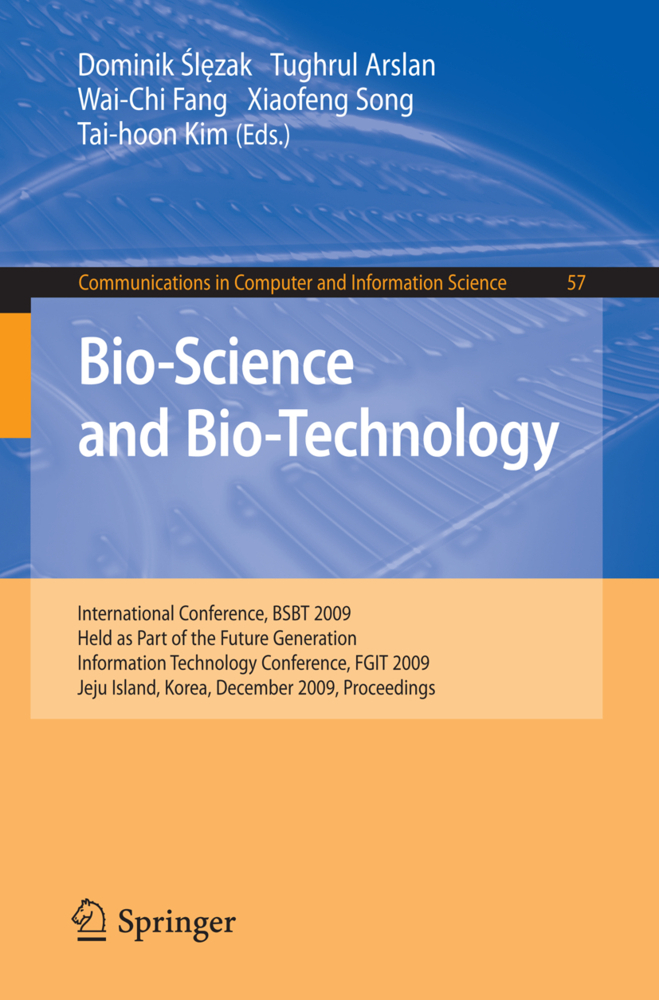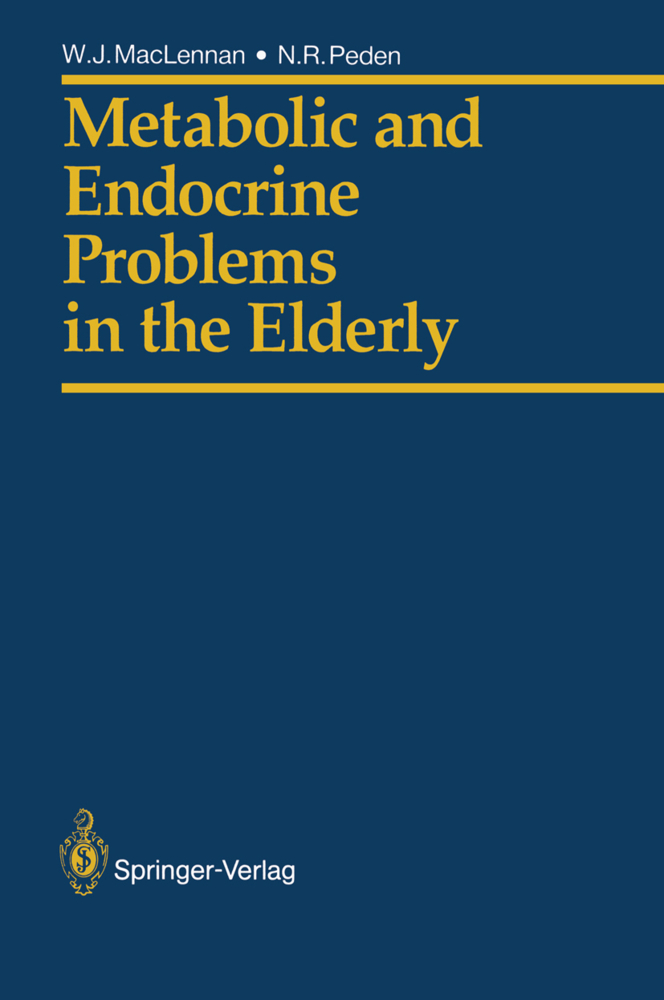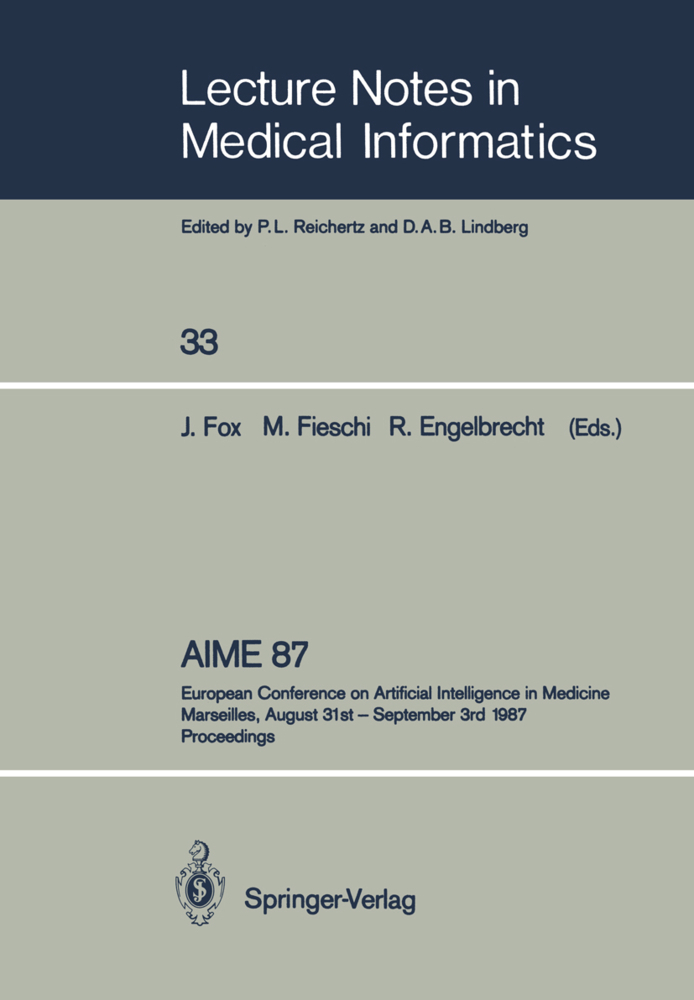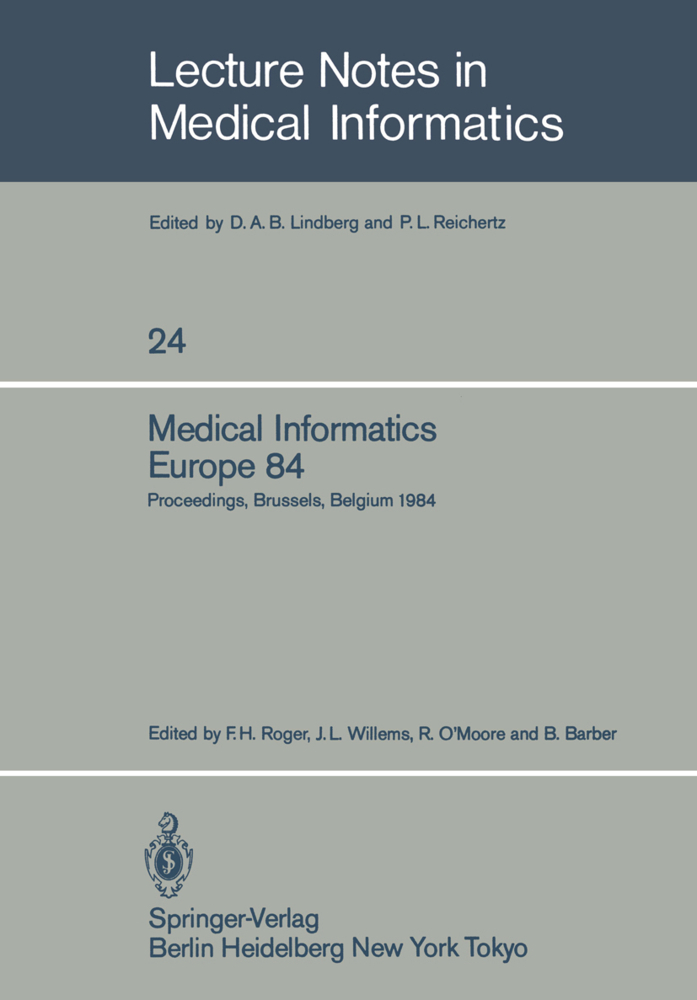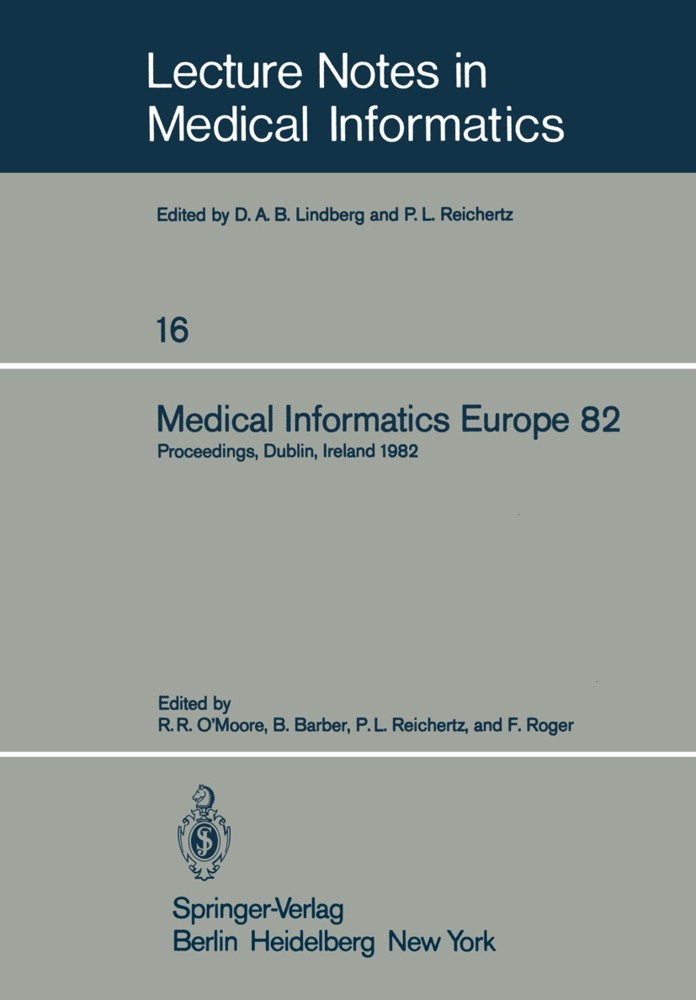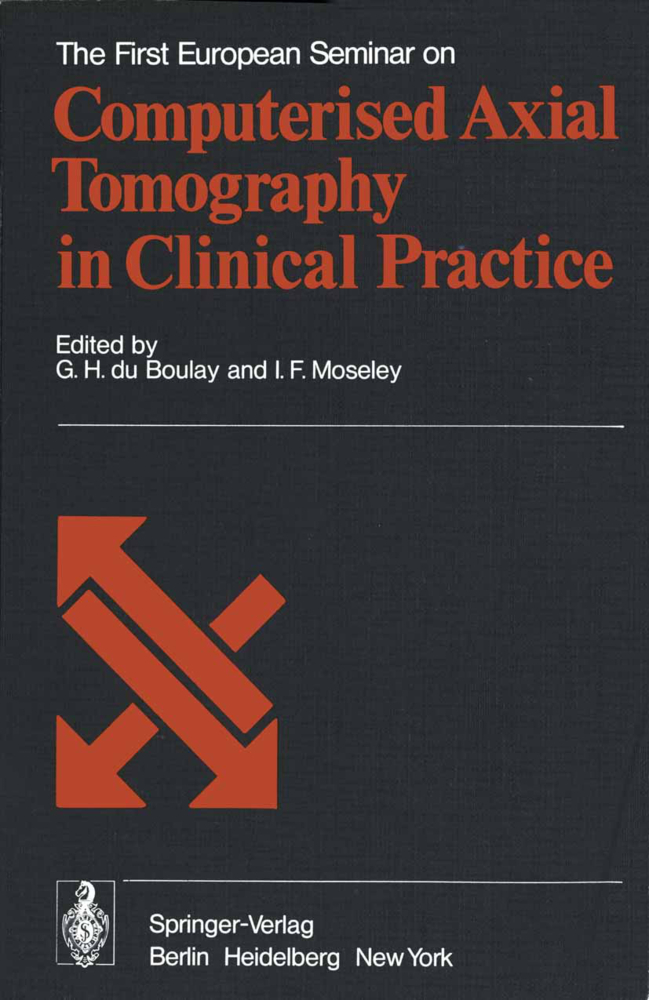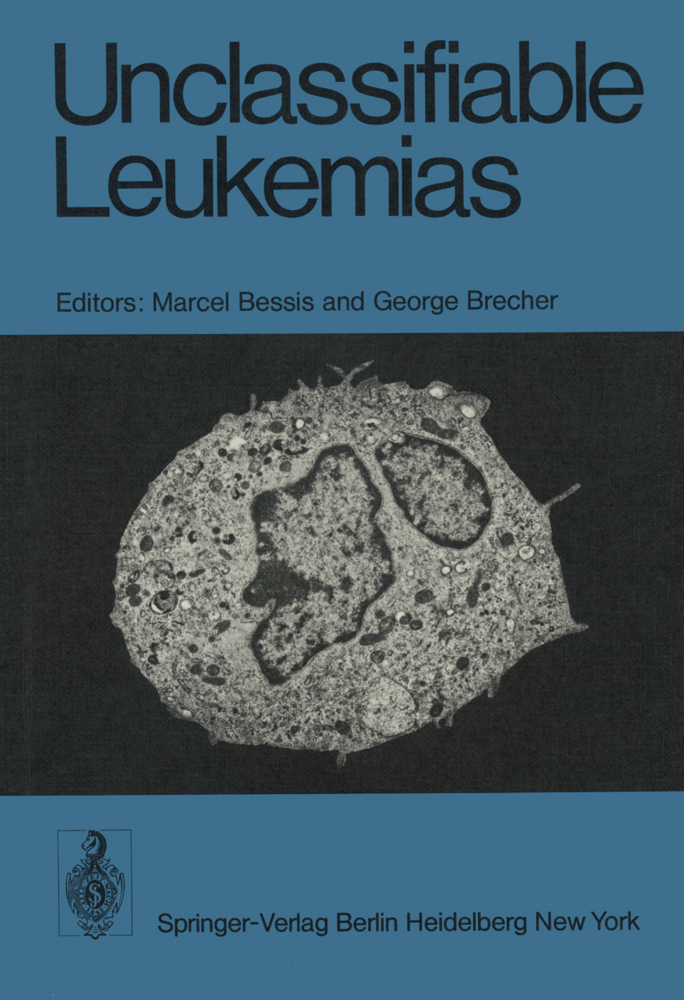Bio-Science and Bio-Technology
International Conference, BSBT 2009 Held as Part of the Future Generation Information Technology Conference, FGIT 2009 Jeju Island, Korea, December 10-12, 2009 Proceedings
Bio-Science and Bio-Technology
International Conference, BSBT 2009 Held as Part of the Future Generation Information Technology Conference, FGIT 2009 Jeju Island, Korea, December 10-12, 2009 Proceedings
As future generation information technology (FGIT) becomes specialized and fr- mented, it is easy to lose sight that many topics in FGIT have common threads and, because of this, advances in one discipline may be transmitted to others. Presentation of recent results obtained in different disciplines encourages this interchange for the advancement of FGIT as a whole. Of particular interest are hybrid solutions that c- bine ideas taken from multiple disciplines in order to achieve something more signi- cant than the sum of the individual parts. Through such hybrid philosophy, a new principle can be discovered, which has the propensity to propagate throughout mul- faceted disciplines. FGIT 2009 was the first mega-conference that attempted to follow the above idea of hybridization in FGIT in a form of multiple events related to particular disciplines of IT, conducted by separate scientific committees, but coordinated in order to expose the most important contributions. It included the following international conferences: Advanced Software Engineering and Its Applications (ASEA), Bio-Science and Bio-Technology (BSBT), Control and Automation (CA), Database Theory and Application (DTA), D- aster Recovery and Business Continuity (DRBC; published independently), Future G- eration Communication and Networking (FGCN) that was combined with Advanced Communication and Networking (ACN), Grid and Distributed Computing (GDC), M- timedia, Computer Graphics and Broadcasting (MulGraB), Security Technology (SecTech), Signal Processing, Image Processing and Pattern Recognition (SIP), and- and e-Service, Science and Technology (UNESST).
Identifying Candidate Disease Gene GAD2 for Obesity by Computational Gene Prioritization Tool ENDEAVOUR
A Novel Suppression Operator Used in optaiNet
Principal Subspace Analysis Based BCG Artifact Removal in Single Channel EEG Signal Measured Inside MRI Scanner
Genetical Analysis of Ascochyta Blight Resistance in Chickpea
A PMMA Micro-suction Tool for Capsular Endoscope Using a Solid Chemical Propellant
Statistical Analysis of Hippocampus Shape Using a Modified Mann-Whitney-Wilcoxon Test
QTL Mapping for Forage Quality-Related Traits in Barley
Fluorimetric Determination of L-3-Hydroxybutyrate Concentrations in the Serum of Normal and Aristolochic Acid-Treated Mice
Designing a Column-Switching High-Performance Liquid Chromatograph System for Enantiomeric Separation of Mouse Urinary D,L-Lactate
A New Approach for Veins Detection
An Analysis of Social Guarantees for Context Based Applications
Data Warehouse Approach to Build a Decision-Support Platform for Orthopedics Based on Clinical and Academic Requirements
Biometric-Gaussian-Stream (BGS) Cipher with New Aspect of Image Encryption (Data Hiding)
DNA Microarray Classification Using Single Hidden-Layer Feedforward Networks Trained by SVD
The Relationship Analysis of Skin Physiology Factors via Grey Theory
Advanced Information and Computational Technology for Biomedical Researches (Special Session)
Advanced Analysis Information Architecture for Dosage Evaluation of Morphine Combining Adjunct
DICOM-Based Multi-Center Electronic Medical Records Management System to Support Clinical Diagnosis
Knowledge Management on the Novel LAGE-Like GlcNAc-Transferase Protein Family
Phylogenetic Analysis of HA Proteins of Influenza Virus H1N1 Reveal New Insight on Virus Pandemic.
The Weighting Analysis of Influence Factor in Clinical Skin Physiology Assessment via Rough Set Method
The Weighting Analysis of Influence Factor in Clinical Skin Physiology Assessment via Rough Set MethodIdentifying Candidate Disease Gene GAD2 for Obesity by Computational Gene Prioritization Tool ENDEAVOUR
A Novel Suppression Operator Used in optaiNet
Principal Subspace Analysis Based BCG Artifact Removal in Single Channel EEG Signal Measured Inside MRI Scanner
Genetical Analysis of Ascochyta Blight Resistance in Chickpea
A PMMA Micro-suction Tool for Capsular Endoscope Using a Solid Chemical Propellant
Statistical Analysis of Hippocampus Shape Using a Modified Mann-Whitney-Wilcoxon Test
QTL Mapping for Forage Quality-Related Traits in Barley
Fluorimetric Determination of L-3-Hydroxybutyrate Concentrations in the Serum of Normal and Aristolochic Acid-Treated Mice
Designing a Column-Switching High-Performance Liquid Chromatograph System for Enantiomeric Separation of Mouse Urinary D,L-Lactate
A New Approach for Veins Detection
An Analysis of Social Guarantees for Context Based Applications
Data Warehouse Approach to Build a Decision-Support Platform for Orthopedics Based on Clinical and Academic Requirements
Biometric-Gaussian-Stream (BGS) Cipher with New Aspect of Image Encryption (Data Hiding)
DNA Microarray Classification Using Single Hidden-Layer Feedforward Networks Trained by SVD
The Relationship Analysis of Skin Physiology Factors via Grey Theory
Advanced Information and Computational Technology for Biomedical Researches (Special Session)
Advanced Analysis Information Architecture for Dosage Evaluation of Morphine Combining Adjunct
DICOM-Based Multi-Center Electronic Medical Records Management System to Support Clinical Diagnosis
Knowledge Management on the Novel LAGE-Like GlcNAc-Transferase Protein Family
Phylogenetic Analysis of HA Proteins of Influenza Virus H1N1 Reveal New Insight on Virus Pandemic.
Slezak, Dominik
Arslan, Tughrul
Song, Xiaofeng
Kim, Tai-hoon
| ISBN | 978-3-642-10615-6 |
|---|---|
| Artikelnummer | 9783642106156 |
| Medientyp | Buch |
| Copyrightjahr | 2009 |
| Verlag | Springer, Berlin |
| Umfang | XII, 151 Seiten |
| Abbildungen | XII, 151 p. |
| Sprache | Englisch |

